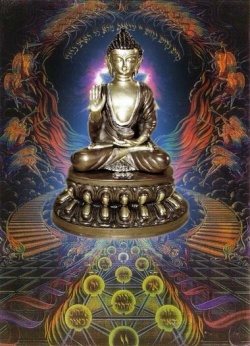Khana Sutta: The Opportunity
SN 35.135
Khana Sutta: The Opportunity
translated from the Pali by
Thanissaro Bhikkhu
© 2004
"It's a gain for you, monks, a great gain, that you've gained the opportunity to live the holy life. I have seen a hell named 'Six Spheres of Contact.' Whatever form one sees there with the eye is undesirable, never desirable; displeasing, never pleasing; disagreeable, never agreeable. Whatever sound one hears there with the ear... Whatever aroma one smells there with the nose... Whatever flavor one tastes there with the tongue... Whatever tactile sensation one touches there with the body... Whatever idea one cognizes there with the intellect is undesirable, never desirable; displeasing, never pleasing; disagreeable, never agreeable.
"It's a gain for you, monks, a great gain, that you've gained the opportunity to live the holy life. I have seen a heaven named 'Six Spheres of Contact.' Whatever form one sees there with the eye is desirable, never undesirable; pleasing, never displeasing; agreeable, never disagreeable. Whatever sound one hears there with the ear... Whatever aroma one smells there with the nose... Whatever flavor one tastes there with the tongue... Whatever tactile sensation one touches there with the body... Whatever idea one cognizes there with the intellect is desirable, never undesirable; pleasing, never displeasing; agreeable, never disagreeable.
"It's a gain for you, monks, a great gain, that you've gained the opportunity to live the holy life." [1]
Footnotes
- ↑ The message here is that in realms where sense objects are totally disagreeable or totally agreeable it is very difficult to practice the holy life, for in the former, one is too distracted by pain; in the latter, too distracted by pleasure.
Source
"Khana Sutta: The Opportunity" (SN 35.135), translated from the Pali by Thanissaro Bhikkhu. Access to Insight (Legacy Edition), 30 November 2013, http://www.accesstoinsight.org/tipitaka/sn/sn35/sn35.135.than.html .
